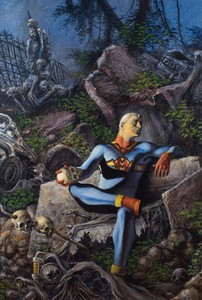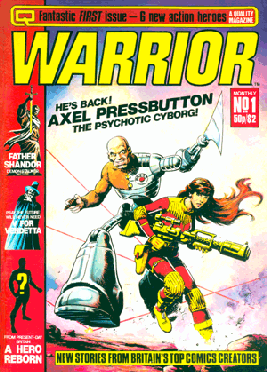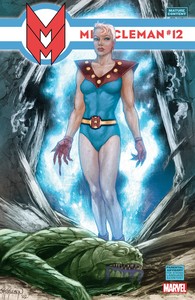
Miracleman, whose civilian name is Michael "Mike" Moran, is a British Golden Age comic book superhero appearing in comic books first published by L. Miller & Son, Ltd. Created by Mick Anglo, the character first appeared in Marvelman #25. The character was subsequently revived in 1982 by Alan Moore and Garry Leach as the lead of Marvelman in the pages of Warrior. After that publication was cancelled, the revival was continued as Miracleman by Eclipse Comics in 1985, with the character renamed accordingly, but went out of print following the company's demise in 1994.

Warrior was a British comics anthology that ran for 26 issues between March 1982 and January 1985. It was edited by Dez Skinn and published by his company Quality Communications. It featured early work by numerous figures who would go on to successful careers in the industry, including Alan Moore, Alan Davis, David Lloyd, Steve Dillon, and Grant Morrison; it also included contributions by the likes of Brian Bolland and John Bolton, while many of the magazine's painted covers were by Mick Austin.

Eclipse Comics was an American comic book publisher, one of several independent publishers during the 1980s and early 1990s. In 1978, it published the first graphic novel intended for the newly created comic book specialty store market. It was one of the first to offer royalties and creator ownership of rights.
Garry Leach was a British comics artist and publisher.

Axel Pressbutton is a fictional character appearing in comic books. A violent cyborg with the face of Ernest Borgnine, a button on his chest which delivers orgasmic pleasure when pressed, and a phobia about vegetation, he was created by Steve Moore and Alan Moore, under the pseudonym "Curt Vile".
Michael Anglo was a British comic book writer, editor and artist, as well as an author. He was best known for creating the superhero Marvelman, later known as Miracleman.
Quality Communications was a British publishing company founded by Dez Skinn that operated from 1982 to c. 2008. The company's most notable publications were the monthly comics anthology Warrior, which featured early work by writer Alan Moore; and the comics trade magazine Comics International, which Skinn published and edited for 16 years. Quality was involved with comics in both the UK and the U.S., mainly with reprint material from Warrior and repackaging 2000 AD material for the U.S. market.
Paul Neary was a British comic book artist, writer and editor.

Jaspers' Warp, sometimes referred to as Crooked World, is a superhero comic book storyline from the British Captain Britain strip printed across several Marvel UK titles between 1981 and 1984.

Kid Miracleman, whose civilian name is Jonathan James "Johnny" Bates, is a fictional British Golden Age comic book character, originally created by Mick Anglo for publisher L. Miller & Son in 1955, and debuting in Marvelman #102, dated July 10 of that year.

Young Marvelman was a British Golden Age superhero comic book, published by L. Miller & Son in the United Kingdom between 1954 and 1963. The lead character was originally created in 1954 by Mick Anglo as a replacement for Captain Marvel Jr due to Fawcett Publications ending the latter's titles following legal action by DC Comics.

Miraclewoman is a fictional comic book character originally created by Alan Moore for publisher Eclipse Comics in 1986 and debuting in Miracleman #10, dated December of that year.

Miracleman is a superhero comic book series, centred on the character of the same name. Originally created by Mick Anglo and published by L. Miller & Son, Ltd. as Marvelman between 1954 and 1963, the character was revived in 1982 for a revisionist story written by Alan Moore, beginning in the pages of British anthology Warrior. From 1985 the character was renamed Miracleman, and the series was continued by American publisher Eclipse Comics until 1993. Since 2009 the rights to the character have been licensed by Marvel Comics, who have published new material.

The British Comic Art Convention was an annual British comic book convention which was held between 1968 and 1981, usually in London. The earliest British fan convention devoted entirely to comics, it was also the birthplace of the Eagle Awards.

Young Miracleman is a fictional British Golden Age comic book superhero, originally created by Mick Anglo for publisher L. Miller & Son in 1954, and debuting in Young Marvelman #25, dated 3 February of that year as a replacement for Fawcett Publications' Captain Marvel Jr., whose civilian name is Richard "Dicky" Dauntless. A comic based on his adventures ran for 345 issues until 1963.
The House of Hammer was a British black-and-white magazine featuring articles and comics related to the Hammer Film Productions series of horror and science fiction films. The brainchild of Dez Skinn, almost every issue of the magazine featured a comics adaptations of a Hammer film, as well as an original comics backup story, such as the long-running feature Van Helsing's Terror Tales.

Marvelman was a British Golden Age superhero comic book, published by L. Miller & Son in the United Kingdom between 1954 and 1963. The lead character was originally created by Mick Anglo as a replacement for Captain Marvel due to Fawcett Publications ending the latter's titles following legal action by DC Comics.

Marvelman Family was a British Silver Age superhero comic book, featuring eponymous team consisting of the characters Marvelman, Young Marvelman and Kid Marvelman. The title was created in 1956 by Mick Anglo for publisher L. Miller & Son as a companion title for the company's Marvelman and Young Marvelman magazines.
The comic book character Marvelman has been the subject of several legal issues, even after being renamed as "Miracleman" in 1985. The character and its derivatives were created by Mick Anglo in 1954 at the request of publisher Len Miller. The copyright has been retained by Anglo ever since, and by Anglo's estate, since his death in 2011.













